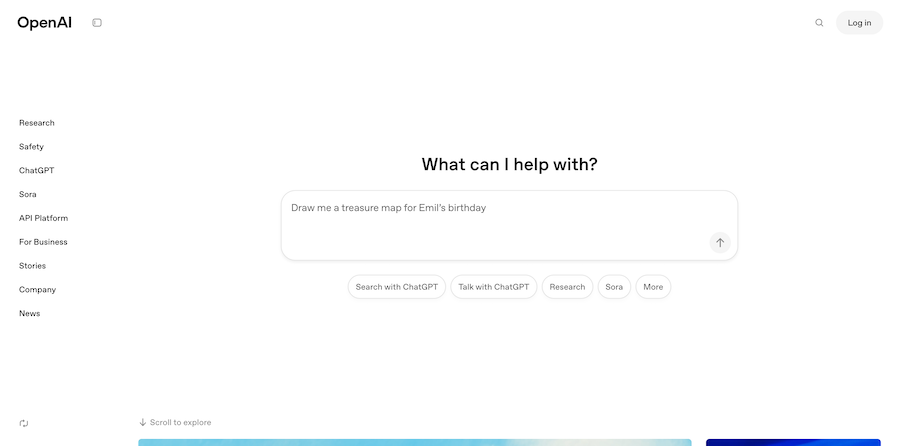

OpenAI
AI Research & Deployment Company Behind ChatGPT
OpenAI is a pioneering artificial intelligence research and deployment company founded in 2015 with a mission to ensure that artificial general intelligence benefits all of humanity. The organization has developed some of the world's most advanced AI systems, including the widely-used ChatGPT conversational assistant, GPT-4 large language model, and DALL-E image generation technology. With a dual focus on cutting-edge research and practical applications, OpenAI provides both consumer-facing products and powerful developer APIs that power thousands of applications across industries. The company offers tiered access to its technologies, from free entry-level services to enterprise-grade solutions, enabling users ranging from casual individuals to large organizations to leverage its AI capabilities. OpenAI maintains a strong commitment to safety, ethical considerations, and responsible deployment while continuing to push the boundaries of what's possible in natural language processing, image generation, and multimodal AI understanding. Through its products, research papers, and collaborative approach with the broader AI community, OpenAI has established itself as one of the most influential organizations shaping the future of artificial intelligence.
Ratings Breakdown
Key Features
ChatGPT conversational AI assistant
GPT-4 large language model API
DALL-E image generation
Whisper speech recognition
Developer APIs and tools
Enterprise AI solutions
AI safety research
Educational resources
AI alignment research
Pros & Cons
Pros
Cutting-edge AI capabilities
Versatile API offerings
Regular model improvements
Powerful conversational abilities
Strong developer ecosystem
Robust documentation
Multimodal capabilities (text, image, audio)
Focus on responsible AI development
Cons
Premium pricing for advanced models
Occasional service interruptions
API usage limits
Some features require technical implementation
Limited historical data knowledge
Potential for hallucinations
Complex pricing structure
What is OpenAI?
OpenAI is a leading artificial intelligence research and deployment company that has become synonymous with advanced AI capabilities and responsible innovation in the field. Founded in December 2015 by a group of technology leaders including Sam Altman, Elon Musk, Greg Brockman, Ilya Sutskever, John Schulman, and Wojciech Zaremba, the organization began as a non-profit with the explicit mission of ensuring that artificial general intelligence (AGI) would benefit all of humanity. In 2019, OpenAI restructured to a "capped-profit" model through OpenAI LP, allowing it to raise capital while maintaining its core mission. The company has pioneered numerous breakthroughs in AI research, particularly in the domain of large language models (LLMs) and generative AI. OpenAI's approach combines fundamental research with practical applications, developing both consumer-facing products and developer tools that have transformed how businesses and individuals interact with AI technology. Its flagship offerings include ChatGPT, an AI assistant capable of natural conversation across a wide range of topics; GPT-4, one of the world's most advanced large language models; and DALL-E, a system that generates unique images from text descriptions. Beyond its technical achievements, OpenAI has actively participated in discussions about AI safety, ethics, and governance, publishing research on potential risks and mitigation strategies. The company maintains a distinctive position in the AI landscape by balancing commercial interests with its founding mission, investing in safety research alongside capability advancements, and working to make powerful AI tools accessible while promoting their responsible use. As AI capabilities continue to evolve rapidly, OpenAI has emerged as one of the most influential organizations shaping both the technical development and societal implementation of this transformative technology.
Key Features
OpenAI offers a comprehensive ecosystem of AI products and services centered around its advanced language and multimodal AI systems. ChatGPT, its flagship conversational assistant, provides natural dialogue-based interactions for answering questions, generating content, brainstorming ideas, and solving problems across countless domains. The service is available through web and mobile interfaces, with tiered access from a free version to the premium ChatGPT Plus subscription featuring the latest models and capabilities. For developers and organizations, the OpenAI API provides programmatic access to the company's AI models, including GPT-4 for natural language understanding and generation, DALL-E for creating original images from text descriptions, and Whisper for accurate speech recognition and transcription. These APIs can be integrated into applications, products, and services across industries from customer service to content creation. The GPT-4 model represents OpenAI's most advanced language model, capable of understanding context, generating human-quality text, translating languages, writing different creative formats, and answering questions in an informative way. The model demonstrates significant improvements in reasoning, factuality, and refusal capabilities compared to earlier versions. OpenAI's developer platform includes comprehensive documentation, code examples, playground environments for experimentation, and tools to fine-tune models for specific use cases. For enterprise customers, OpenAI offers dedicated support, service level agreements, higher rate limits, and enhanced security features. The company's ongoing research continuously improves model capabilities while focusing on reducing harmful outputs, biases, and potential misuse. Additional tools include the Moderation API for content safety screening, embedding models for semantic search and content clustering, and specialized function calling capabilities for structured outputs. OpenAI also offers educational resources including guides, tutorials, cookbooks, and case studies to help users effectively implement AI in their workflows. The platform's features are regularly expanded through model updates, new capabilities, and refined tools based on both technical advancements and user feedback. For specific enterprise needs, OpenAI provides custom solutions, including model customization, specialized deployment options, and tailored integration support.
Who Should Use OpenAI?
OpenAI's products and services cater to a diverse range of users united by their interest in leveraging advanced AI capabilities. Individual professionals across fields benefit from ChatGPT for research assistance, writing enhancement, creative ideation, learning complex concepts, and automating routine information-based tasks. Students and educators utilize the technology for tutoring assistance, explaining difficult concepts, generating practice materials, and exploring ideas through interactive conversation. Content creators, including writers, marketers, and social media managers, leverage OpenAI's tools for drafting articles, creating engaging content, brainstorming ideas, and optimizing their creative workflows. Software developers and engineers integrate OpenAI's APIs to build intelligent applications, enhance existing products with AI capabilities, automate code generation, and create specialized tools for particular domains or industries. Business leaders and entrepreneurs use the technology for market research, business planning, competitive analysis, and exploring new product or service opportunities through AI-powered insights. Customer service teams implement OpenAI-powered chatbots and assistants to enhance support capabilities, provide 24/7 assistance, and handle routine inquiries while escalating complex issues to human agents. Research professionals across academic disciplines and industries utilize the technology to assist literature reviews, data analysis, hypothesis generation, and exploration of research questions from new perspectives. Healthcare professionals (in appropriate non-clinical contexts) leverage the technology for administrative support, patient education materials, and keeping current with research developments. Legal professionals use OpenAI tools for contract analysis, legal research assistance, and document drafting support while maintaining appropriate human oversight. Translators and language professionals benefit from the multilingual capabilities for translation assistance, language learning, and cross-cultural communication support. While the generalist capabilities of OpenAI's technology make it relevant across virtually all knowledge-based activities, users should recognize both its strengths (breadth of knowledge, flexible application, constant improvement) and limitations (potential for inaccuracies, knowledge cutoff dates, and the need for human verification in critical applications). The ideal user approaches the technology as an enhancing tool rather than a replacement for human expertise, particularly in domains requiring specialized knowledge, ethical judgment, or high-stakes decision making.
Pricing
OpenAI offers a multi-tiered pricing structure designed to accommodate different usage levels from individual consumers to enterprise organizations. For consumer access to ChatGPT, the company provides a free tier with basic capabilities and access to older models, subject to availability during peak times. The ChatGPT Plus subscription, priced at $20 per month, delivers priority access even during high-demand periods, faster response times, early access to new features, and utilization of the most advanced AI models including GPT-4. A newer Team tier at approximately $30 per user per month adds collaborative features and administrative controls for small group usage. For developers and businesses integrating OpenAI's technology through APIs, the pricing follows a usage-based model varying by specific model, capabilities, and compute requirements. GPT-3.5 Turbo, suitable for many applications, starts at approximately $0.0015 per 1,000 tokens (roughly 750 words), while the more advanced GPT-4 models range from $0.03 to $0.06 per 1,000 tokens, with higher rates for longer context models. DALL-E image generation pricing varies by resolution, typically ranging from $0.016 to $0.08 per image. The Whisper speech-to-text API is priced at approximately $0.006 per minute of audio processed. Enterprise customers can access custom pricing with volume discounts, dedicated support, and service level agreements through direct negotiation with OpenAI's sales team. Educational institutions may qualify for special pricing programs or grants in certain circumstances. All pricing tiers include access to the respective models' capabilities, with primary differences in rate limits, support levels, and additional features rather than core functionality. The company occasionally updates its pricing structure as new models are released or existing ones become more efficient. For developers, OpenAI provides usage tracking tools and configurable limits to help manage costs and prevent unexpected charges. While premium pricing for the most advanced models represents a significant investment for some use cases, many users find the capabilities justify the cost compared to developing similar AI capabilities in-house or the human time saved through automation. The company's approach of offering free or low-cost entry points alongside premium options has helped democratize access to advanced AI while supporting the sustainable development of increasingly capable systems.
User Experience
Users consistently highlight OpenAI's products for their exceptional capabilities while noting both strengths and areas for improvement in the overall experience. ChatGPT's web and mobile interfaces receive praise for their clean, minimalist design that focuses attention on the conversation, with straightforward input methods and clear presentation of AI responses. The conversational quality represents a defining feature of the experience, with users reporting natural-feeling interactions that maintain context across complex discussions, though occasionally requiring rephrasing or clarification for optimal results. Response speed varies by subscription tier and model used, with premium users enjoying consistently quick replies while free users may experience delays during peak usage periods. The accuracy and helpfulness of responses generally impresses users, particularly for informational queries, creative assistance, and problem-solving, though the technology's limitations with factual reliability, reasoning on complex topics, and knowledge cutoff date occasionally cause frustration. For developers using the API, the documentation receives high marks for clarity, comprehensive examples, and regular updates, though some note a learning curve for optimizing prompts and managing the nuances of different models. The Playground interface earns particular appreciation for allowing experimentation with different models and parameters without writing code. API reliability has improved over time, though occasional service interruptions still occur during periods of extremely high demand or when new models are being deployed. The mobile app experience has evolved significantly since launch, with improvements in stability, feature parity with the web version, and interface refinements, though some users report occasional synchronization issues between platforms. For enterprise customers, the account management and support responsiveness generally meets expectations, with dedicated assistance for implementation challenges and optimization. The pricing transparency receives mixed feedback, with some users appreciating the clear per-token or per-minute rates while others find the consumption-based model difficult to predict for variable usage patterns. OpenAI's approach to product evolution, with regular model improvements and new feature introductions, creates a sense of ongoing advancement that users value, though the pace of change occasionally creates learning curves as capabilities expand. Privacy considerations remain important to users, with OpenAI's data handling policies and opt-out options for training data generally seen as responsible, though some users desire even greater transparency and control. The overall user sentiment reflects an appreciation for technology that often exceeds expectations while acknowledging the inevitable growing pains of rapidly evolving AI capabilities.
Bottom Line
OpenAI has established itself as a transformative force in the artificial intelligence landscape by successfully bringing advanced AI capabilities to mainstream accessibility while maintaining a commitment to responsible development. The company's flagship products—particularly ChatGPT and its underlying models—have redefined expectations for AI assistants, demonstrating unprecedented capabilities in understanding context, generating human-quality content, and engaging in meaningful dialogue across countless domains. These technologies have found application in virtually every knowledge-based field, from education and software development to creative writing and business strategy. What distinguishes OpenAI in the increasingly crowded AI market is its combination of technical excellence with a thoughtful approach to deployment. The organization consistently balances pushing capability boundaries with implementing safeguards, transparency measures, and ethical considerations—even when these occasionally constrain short-term product functionality. While not without limitations—including potential inaccuracies, knowledge cutoffs, and occasional service constraints—OpenAI's offerings represent the current state-of-the-art in accessible AI, with a rapid pace of improvement that continues to expand possibilities. The pricing structure, while premium for the most advanced capabilities, provides multiple entry points from free consumer access to enterprise-grade solutions, democratizing access while supporting sustainable development. For individuals and organizations looking to enhance productivity, creativity, and problem-solving with AI assistance, OpenAI provides tools that can meaningfully augment human capabilities across countless use cases. As the field continues to evolve rapidly, OpenAI's dual focus on advancing capabilities while promoting responsible use positions it uniquely in shaping how artificial intelligence will transform society, work, and human-computer interaction in the coming years. The company's influence extends beyond its direct products to setting standards and expectations for the entire AI industry, making it one of the most consequential technology organizations of the current era.
Share with others
Was this content useful to you?
Found an error?
We strive for accuracy. If you've spotted incorrect information about this tool, please let us know.
Report ErrorMore from this Category
More from this Category

Claude
AI Assistant Focused on Helpfulness, Harmlessness & Honesty
An advanced AI assistant developed by Anthropic that emphasizes helpful, honest, and harmless interactions, offering nuanced conversations, creative content generation, and thoughtful analysis across a wide range of topics.
